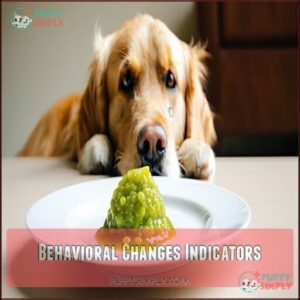This site is supported by our readers. We may earn a commission, at no cost to you, if you purchase through links.
 No, your dog shouldn’t eat wasabi.
No, your dog shouldn’t eat wasabi.
Unlike humans who might enjoy the spicy kick, your furry friend’s digestive system isn’t built for this fiery condiment. If your pup sneaks a taste, they’ll likely experience immediate discomfort—think watery eyes, excessive drooling, and an upset stomach that’ll have them doing the "potty dance" much more urgently than usual.
Wasabi contains compounds that irritate dogs’ sensitive mouths and digestive tracts, potentially causing pain and distress. Even small amounts can lead to vomiting or diarrhea.
Keeping wasabi and similar spicy foods safely out of paw’s reach protects your pooch from unnecessary suffering, ensuring they do not experience excessive drooling.
Table Of Contents
Key Takeaways
- No, your dog should not eat wasabi as it causes significant discomfort including excessive drooling, vomiting, diarrhea, and respiratory irritation even though it’s not technically toxic.
- If your dog accidentally consumes wasabi, offer fresh water immediately to dilute the spice, wipe their mouth with a damp towel, and monitor for concerning symptoms like persistent vomiting, difficulty breathing, or severe lethargy.
- You’ll need to store wasabi and wasabi-containing foods in secure containers on high shelves, practice supervised consumption of Asian foods, and teach "leave it" commands to prevent accidental ingestion.
- You should offer dog-friendly alternatives like carrots, plain cooked sweet potatoes, freeze-dried meats, or xylitol-free peanut butter instead of sharing spicy foods with your furry friend.
Wasabi Effects on Dogs
You’ll quickly notice if your furry friend gets into wasabi, as they might sneeze, gag, or show signs of stomach upset like vomiting or diarrhea.
While wasabi isn’t toxic to dogs, the spicy kick that makes your sushi experience exciting can cause your pup significant discomfort and temporary pain.
Stomach Upset Symptoms
Your dog’s wasabi encounter can trigger serious stomach upset symptoms.
If your furry friend consumes this spicy condiment, watch for these gastrointestinal issues:
- Sudden diarrhea signs appearing within 2-6 hours
- Vomiting frequency increasing to multiple episodes
- Complete appetite loss lasting 12-24 hours
- Visible abdominal pain when touching your dog’s belly
- Lethargy causes concern, especially with excessive drooling
These dog digestive issues typically resolve within 24-48 hours, often resulting in a return to normal appetite and behavior.
Sneezing and Gagging Reactions
Panic erupts when dogs eat wasabi! Your pup’s sneezing and gagging reactions are reflexive actions to clear the irritant from their system.
The spicy paste acts as a powerful nasal irritant, triggering immediate distress as their body works to expel the substance. These airway irritation symptoms are typically temporary, lasting only minutes after exposure.
While concerning to watch, these spice discomfort responses usually resolve quickly without intervention, and are a result of reflexive actions to clear the irritant from their system.
Discomfort and Pain Causes
While sneezing and gagging are visible reactions, let’s look at what’s happening inside your pup’s body.
Wasabi’s intense spice causes mouth irritation and throat discomfort in dogs, whose sensitivity to spicy food is much higher than ours.
Their taste buds and mucous membranes can’t handle the burn, triggering reflexive responses.
Stomach pain and gastrointestinal upset follow as wasabi irritates their digestive tract, causing distress that’s uncomfortable but rarely dangerous.
Can Dogs Eat Wasabi
No, your dog shouldn’t eat wasabi. While technically not toxic, wasabi causes significant gastrointestinal upset in dogs.
Their canine digestion system isn’t designed to handle spicy foods, and their flavor sensitivities are much stronger than ours.
When considering wasabi for dogs, remember:
- A tiny green blob that’s harmless to you can lead to hours of discomfort for your four-legged friend
- Different breeds show varying tolerance levels, but none truly "enjoy" wasabi
- Even small amounts can trigger dramatic reactions like excessive drooling or frantic water drinking
It’s also worth noting that wasabi can cause distress and pain due to the burning sensation. Stick to safe spices and wasabi alternatives to avoid potential dog poisoning symptoms.
Wasabi Toxicity Risks
You’ll want to know that while wasabi isn’t toxic to dogs, its compounds can cause significant stomach upset and irritation to your pet’s sensitive digestive system.
Your furry friend’s reaction to these spicy chemicals might remind you of your own wasabi mishap, but dogs lack the appreciation for that eye-watering culinary adventure we humans sometimes enjoy, which can be a significant concern.
Glucosinolates Compounds
Now that you understand if dogs can eat wasabi, let’s look at what makes it problematic.
Glucosinolates are the troublemakers behind wasabi’s kick. These sulfur compounds are part of the plant’s defense system.
Digestive upset can occur if dogs consume similar spicy foods.
| Glucosinolate Facts | Impact on Dogs |
|---|---|
| Found in cruciferous plants | Can upset dog’s stomach |
| Break down when damaged | Triggers mouth irritation |
| Create pungent flavor | Causes discomfort |
| Contains sulfur compounds | May lead to digestive issues |
| Acts as plant defense | Not toxic but problematic |
Isothiocyanate Release
While glucosinolates themselves aren’t harmful, the real culprit is what happens next.
When your dog chomps on wasabi, these compounds transform into isothiocyanates. They’re airborne irritants that trigger sinus effects and cellular impact in your pup’s sensitive tissues.
The compound potency varies, but even small amounts can cause quite the spicy food reaction in dogs, creating that familiar "wasabi burn" you’ve experienced.
Gastrointestinal Tract Irritation
Beyond triggering those immediate sneezing fits, wasabi wreaks havoc on your dog’s digestive system.
The spicy paste directly irritates their gastrointestinal tract, potentially causing acid reflux, vomiting, diarrhea, and abdominal pain.
You’ll notice your pup experiencing appetite loss and showing clear dog distress signs after wasabi ingestion.
These pet digestive issues can last several hours as their system struggles to process the unfamiliar irritant.
Think of it as their stomach throwing a full-blown protest rally!
Dog Wasabi Reactions
You’ll quickly notice if your dog has eaten wasabi as they might sneeze, gag, or frantically paw at their face while looking at you with an expression that says "why would you leave that green stuff where I could reach it?"
These reactions are your dog’s way of telling you they’ve made a spicy mistake, ranging from mild discomfort to more serious symptoms that may require your attention, which can be a clear indication of their discomfort.
Mild Reactions Signs
When your dog sneaks a taste of wasabi, you’ll likely notice these mild reaction signs:
- Face rubbing and pawing at mouth (their version of "spicy regret")
- Temporary symptoms like drooling or gastro upset
- Hyperactivity signs as they try to escape the heat
- Sneezing or head shaking to clear the sensation
Most dogs recover quickly from these wasabi effects without lasting issues, just monitor them for worsening dog distress signs, to ensure their quick recovery.
Serious Reactions Warning Signs
While mild reactions might resolve quickly, watch for these serious warning signs: excessive drooling or pawing at the mouth after wasabi ingestion.
Persistent vomiting, significant gastrointestinal symptoms, or abdominal pain require immediate veterinary attention. Your pup’s wasabi effects might escalate to severe digestive upset, causing considerable discomfort in their mouth and stomach.
Breathing difficulty or lethargy signs following exposure shouldn’t be ignored—these red flags indicate your furry friend needs professional help right away.
Behavioral Changes Indicators
After consuming wasabi, your dog’s behavior can reveal vital signs of distress.
Your dog’s frantic sneezes and pawing say it all—wasabi isn’t the adventure they signed up for!
Watch for these behavioral changes indicating a problem:
- Unusual lethargy or reluctance to move (Post-Wasabi Lethargy)
- Refusing meals or treats (Appetite Loss)
- Excessive drooling beyond normal amounts
- Repeatedly pawing at face or mouth
- Sudden hyperactivity signs like pacing or whining
These dog wasabi reaction indicators mean your pup isn’t just being dramatic—they’re truly uncomfortable. The signs of distress can be critical to identify.
Wasabi Consumption Prevention
You’ll save yourself an emergency vet visit by keeping wasabi and wasabi-containing foods stored safely out of your curious pup’s reach.
Think of it as dog-proofing your sushi night – store wasabi in sealed containers on high shelves and offer your furry friend appropriate dog treats instead of sharing your spicy condiments.
Storage Safety Tips
Now that we’re aware of how dogs react to wasabi, let’s focus on keeping this spicy condiment safely stored.
Proper storage isn’t just important—it’s your first line of defense against curious paws.
Many owners find success using specialized storage options to maintain freshness.
| Storage Location | Pet Safety Tips |
|---|---|
| Refrigerator | Use airtight containers on high shelves |
| Pantry | Proper labeling and child-safety locks |
| Cabinets | Temperature control and secured doors |
| Counter | Never leave wasabi unattended, use shelf placement strategically |
To ensure pet safety, it’s crucial to follow these guidelines and store wasabi in a secure location, making it inaccessible to dogs and other pets, thus maintaining a safe environment and preventing unwanted accidents.
Reducing Access Methods
Keep wasabi out of your dog’s reach with these simple prevention methods:
- Use secure storage containers and place them in elevated cabinets where curious paws can’t reach.
- Practice supervised consumption of all Asian foods, putting plates up immediately after meals.
- Install child locks on lower cabinets containing potentially toxic foods for dogs.
Training your pup to respond to "leave it" commands creates an additional safety barrier against wasabi mishaps, which is a crucial step in preventing wasabi accidents.
Dog-Friendly Alternatives
Several dog-friendly alternatives exist that’ll satisfy your pup without the wasabi burn.
Try safe vegetables like carrots or plain, cooked sweet potatoes.
Healthy proteins such as boiled chicken or white rice make excellent treats when your dog’s stomach needs settling.
Commercial canine treats formulated specifically for dogs provide balanced nutrition too.
For an Asian-inspired option without the heat, plain nori seaweed (without wasabi) offers a crunchy, safe snack.
Nori also provides essential vitamins for dogs, contributing to their overall health.
Dog Wasabi Emergency Care
If your dog has gobbled up wasabi and is now doing the "spicy dance," you’ll need to act quickly but calmly.
You’ll want to offer fresh water to ease their burning mouth, monitor for serious symptoms like difficulty breathing or extreme distress.
Call your vet right away if things don’t improve within 30 minutes, and remember to stay calmly while handling the situation.
First Aid Response
Now that you know how to prevent wasabi mishaps, let’s talk about immediate action if your furry friend gets a spicy surprise.
If your dog eats wasabi, first wipe their mouth with a damp towel to remove residue.
Offer water to dilute the spice, but don’t force it. Watch for pawing at the face, drooling, or sneezing.
Keep them calm in a quiet space while monitoring symptoms closely. Consider dog wasabi first aid supplies for preparedness and to handle the situation with care.
Veterinary Guidance Importance
Many situations require veterinary guidance when your dog consumes wasabi. Don’t wait until symptoms worsen before seeking expert consultation.
Here are 5 critical times to get veterinary attention:
- Prolonged vomiting or diarrhea (over 24 hours)
- Difficulty breathing or excessive drooling
- Signs of severe abdominal pain
- Lethargy or weakness
- Any symptom that makes you worried about your pet’s condition, which may indicate a need for immediate expert consultation.
Monitoring Symptoms
After getting veterinary advice, watch your dog closely for 24-48 hours.
Monitor for symptom persistence like continued vomiting or diarrhea. Check for abdominal pain by gently touching your dog’s belly—wincing means trouble.
Fever monitoring is simple with a rectal thermometer; anything above 103°F is concerning.
Lethargy signs after wasabi ingestion shouldn’t be ignored. Your pup shouldn’t be doing their "couch potato" impression unless it’s movie night, and showing lethargy signs or having a fever is a cause for concern.
Wasabi-Free Diet Options
You’ll find plenty of tasty alternatives to spicy wasabi that your furry friend can safely enjoy without the tummy troubles.
From simple homemade chicken and rice meals to specially formulated commercial treats, these wasabi-free options will keep your pup’s tail wagging while maintaining their nutritional needs.
Dog-Safe Treats
After handling a wasabi emergency, you’ll want to focus on dog-safe treats instead. Your furry friend deserves tasty alternatives that won’t send them to the vet.
- Commercial options like freeze-dried meats provide protein without toxic ingredients
- Small pieces of apple or carrot offer crunch without wasabi’s sting
- Peanut butter (xylitol-free) treats give dogs something to enjoy safely
Always check treat size to prevent choking hazards. Many owners also choose to buy freeze-dried meat options.
Homemade Diet Recipes
A pot of homemade chicken and rice can soothe your dog’s stomach after a wasabi mishap.
Try these simple recipes that prioritize gentle nutrition during recovery.
| Recipe Type | Ingredients | Preparation |
|---|---|---|
| Bland Diet | White rice, boiled chicken, low-salt broth | Cook rice, drain fat from chicken, mix with broth |
| Recipe Variations | Ground turkey, pumpkin, sweet potato | Boil separately, combine in equal portions |
| Food Reintroduction | Regular dog food, bland diet | Mix gradually, increasing regular food daily |
These recipes are designed to help your dog recover with a bland diet and gradual food reintroduction.
Balanced Nutrition Importance
While homemade recipes help during recovery, your dog’s long-term health depends on balanced nutrition.
Dogs have specific nutrient requirements that differ from humans.
Proper portion control prevents weight issues, while adequate hydration supports digestion.
Your furry friend needs the right mix of proteins, fats, and carbohydrates—not spicy surprises like wasabi.
Consult your vet about dietary guidelines customized to your dog’s age, size, and activity level, as well as providing adequate hydration.
Protecting Dogs From Wasabi
You’ll need to keep wasabi far from your curious pup’s reach, just like you’d hide your favorite shoes from a teething puppy.
Making simple changes to your food storage habits and being mindful during sushi night can save you both from an emergency vet visit and your dog from a spicy surprise they won’t appreciate.
Education and Awareness
Keeping your dog safe starts with knowing what they shouldn’t eat. With wasabi for dogs becoming a concerning trend online, pet education is more important than ever.
- Share pet toxicity information with family members and dog sitters
- Follow reliable veterinary sources for dog dietary concerns
- Join pet parent groups to stay updated on safety issues
- Teach children why sharing wasabi is dangerous for dogs
- Create a "pet safe foods" list for your refrigerator
Safe Food Choices
Instead of wasabi, choose from a variety of safe foods for dogs.
Your pup’s balanced diet should include dog-friendly protein sources like plain chicken or beef.
Many safe vegetables make excellent treat alternatives – carrots, green beans, and cucumbers are winners in the canine world.
Remember, proper dog nutrition isn’t rocket science; it’s about following basic dog dietary guidelines and avoiding toxic foods.
Your furry friend will thank you!
Accident Prevention Measures
During mealtime, always supervise your dog when wasabi is present.
Implement secure storage by keeping spicy condiments in sealed containers on high shelves.
Educate guests about not sharing their wasabi-containing foods with your curious pup.
Have safe alternatives ready when you’re enjoying sushi.
If accidents happen, take immediate action by offering water and monitoring for dog health risks.
These pet safety measures can prevent a wasabi mishap from becoming a vet visit.
Digestive issues are possible if dogs consume wasabi.
It is crucial to be aware of the potential dangers of wasabi to ensure immediate action is taken in case of an accident, and to have a plan for secure storage.
Frequently Asked Questions (FAQs)
Is wasabi good for dogs?
No, wasabi isn’t good for dogs.
While not toxic, it can cause significant discomfort including stomach upset, vomiting, and sneezing.
You’re better off sticking with dog-friendly treats your furry friend will actually enjoy.
Is it safe to take Wasabi before surgery?
You should avoid wasabi for at least two weeks before surgery.
It may slow blood clotting and increase your risk of bleeding during the procedure.
Better safe than sorry in surgical preparation!
What happens if a dog eats wasabi?
If your dog eats wasabi, they’ll likely sneeze, gag, or show discomfort.
While not toxic, wasabi can cause temporary stomach upset, vomiting, or diarrhea.
Offer water and monitor them closely for persistent symptoms.
Can dogs eat wasabi peas?
No, your furry friend shouldn’t eat wasabi peas.
They’re doubly problematic – containing both spicy wasabi that causes stomach upset and peas that can be difficult for dogs to digest properly.
Can dogs taste wasabi?
Like a firecracker in their mouth, your pup can definitely taste wasabi.
Dogs have fewer taste buds than humans but they’ll still react strongly to its spicy punch, which is why you shouldn’t share this zesty condiment.
What should I do if my dog eats wasabi?
If your pup ate wasabi, offer water to dilute the spice and observe for distress.
For severe reactions like difficulty breathing or prolonged vomiting, contact your vet immediately.
Most cases resolve without intervention.
Can dogs eat sushi grade?
You’ve picked up some fancy sushi, but should you share?
Plain sushi-grade fish can be safe for dogs in small amounts, but avoid raw fish with wasabi, soy sauce, or other seasonings.
Can Dogs Eat Wasabi Almonds?
No, dogs shouldn’t eat wasabi almonds.
They contain two problematic ingredients – wasabi‘s spiciness can cause stomach upset, while almonds aren’t toxic but may cause digestive issues or choking hazards for your furry friend.
will wasabi hurt dogs?
While wasabi won’t send your pup to Davy Jones’ locker, it can cause significant discomfort.
It’s not toxic but can trigger stomach upset, vomiting, and respiratory irritation.
You’ll want to keep this spicy treat away from Fido.
what happens if a dog eats wasabi?
If your furry friend nibbles wasabi, they’ll likely experience temporary discomfort including sneezing, gagging, drooling, and possibly stomach upset.
It’s not toxic, but you’ll want to offer water and monitor for unusual behavior, ensuring your pet’s well-being by providing water.
Conclusion
Protecting your pooch from problematic peppers is paramount.
While you might enjoy spicy sensations, your four-legged friend can’t safely consume wasabi.
Can dogs eat wasabi? The clear answer is no.
Keep your kitchen counters clear of this fiery green paste, store sushi nights’ leftovers in secure containers, and opt for dog-friendly treats instead.
Your vigilance guarantees your canine companion avoids unnecessary pain and potential emergencies, keeping tails wagging and tummies happy.

















